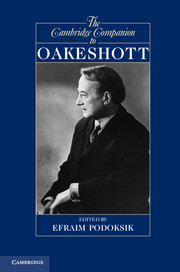Book contents
- Frontmatter
- Introduction
- Part I Oakeshott's philosophy
- Part II Oakeshott on morality, society and politics
- 6 Practical life and the critique of Rationalism
- 7 Oakeshott's ideological politics: conservative or liberal?
- 8 Rhetoric and political language
- 9 Oakeshott's On Human Conduct
- 10 Oakeshott's political theory: recapitulation and criticisms
- Part III Oakeshott and others
- Index
6 - Practical life and the critique of Rationalism
from Part II - Oakeshott on morality, society and politics
Published online by Cambridge University Press: 28 September 2012
- Frontmatter
- Introduction
- Part I Oakeshott's philosophy
- Part II Oakeshott on morality, society and politics
- 6 Practical life and the critique of Rationalism
- 7 Oakeshott's ideological politics: conservative or liberal?
- 8 Rhetoric and political language
- 9 Oakeshott's On Human Conduct
- 10 Oakeshott's political theory: recapitulation and criticisms
- Part III Oakeshott and others
- Index
Summary
‘Experience’, of all the words in the philosophic vocabulary, is the most difficult to manage.
INTRODUCTION
The entire work of Michael Oakeshott can be considered as a sustained reflection on a single problem: the relation of reason and the moral life. The question (or questions) that inform Oakeshott's wide and diverse body of writings are: is the aim of reason to describe the most general features of moral life as it presents itself to the ordinary understanding, or does reason aim to revise our ordinary beliefs and practices in order to offer a philosophically more cogent picture of the world? Is reason descriptive or revisionary? At bottom, this is a variant of perhaps the oldest of all philosophical problems, namely, the problem of theory and practice. Is the task of philosophy to lead us out of the cave of received opinion and affect a transformation of the moral life, as Plato vividly affirmed? Or is the aim of philosophy largely to reaffirm established opinions and beliefs leaving ‘everything as it is’ as Wittgenstein maintained?
At the core of Oakeshott's moral theory is the concept of experience. Experience remains for him the touchstone for philosophy. He appeals to an underlying core of common-sense beliefs and practices from which philosophy departs at its peril. From his early Experience and its Modes to the essays composing Rationalism in Politics to his magnum opus On Human Conduct, Oakeshott appealed to words like ‘tradition’ and ‘practice’ to set limits to the scope of philosophic inquiry.
- Type
- Chapter
- Information
- The Cambridge Companion to Oakeshott , pp. 129 - 152Publisher: Cambridge University PressPrint publication year: 2012
- 1
- Cited by



